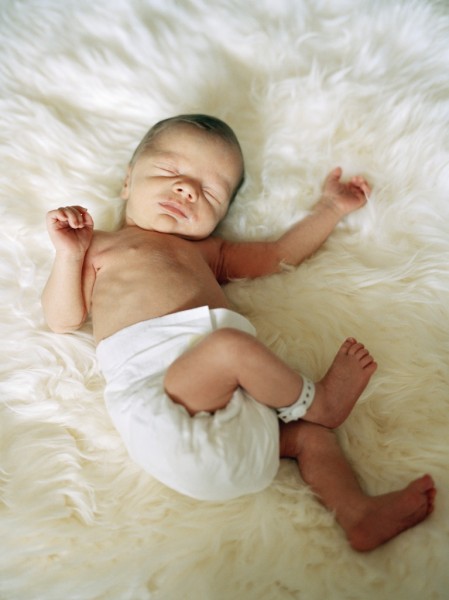A new study finds that children who sleep on animal skins in the first months of life are less likely to develop asthma later in childhood. But before you trade in your pretty-patterned organic cotton crib sheets for a sheepskin, know that some experts warn soft sleeping surfaces are unsafe for babies.

A German study finds that animal fur can lower animal risk in children but experts warn that babies who sleep on sheep skins are at increased risk for SIDS. (Getty)
In Germany new parents have long placed sheepskins cribs to create a soft, cozy sleeping space for their babies. These wooly hides that can be purchased from Ikea for less than $100 are growing in popularity in the United States with moms looking to raise their children in a more natural fashion. Sheepskins are popular because they’re usually pesticide free and regulate temperature, keeping baby cool in summer and warm in winter. But are fuzzy skins a good option for sleeping babies?
A new study unveiled last week at the European Respiratory Society International Congress took a close look at data collected from 2,441 German children and found that babies who sleep on animal fur such as sheepskins in the first three months have a decreased risk for asthma at age 10. These kids are also less likely to have hay fever and wheezing, according to Time.com.
The research is part of a growing group of studies supporting the “hygiene hypothesis,” which suggests that children exposed to germs are less likely to have illnesses such as asthma and allergies. The theory is that parasites, bacteria, and viruses help stimulate and strengthen the immune system.
The hygiene hypothesis was born in 1989 when an epidemiologist in Britain, David Strachan, observed that babies born into households with lots of siblings were less likely than other babies to develop allergies and asthma. The same proved true of babies who spent significant time in day care. Dr. Strachan hypothesized that the protection came from experiencing an abundance of childhood illnesses.
Numerous studies conducted over the past 25 years support Strachan’s hypothesis and some studies have found that kids who are exposed to animals, whether its cows on a farm or a household dog, also have lower instances of allergies and asthma.
Sheepskins and other animal furs are crawling with healthful microscopic organisms. “We think that this animal fur might act as a reservoir for diverse kind of microbial components which [accumulate] over time within the animal fur,” lead study author Christina Tischer of the German Research Center for Environmental Health told Time.com.
But while sheepskins might help prevent asthma, some experts warn that soft sleeping surfaces can be dangerous for babies.
“We do not recommend that babies sleep on sheepskins, as some of the first studies on SIDS [sudden infant death syndrome] demonstrated that sleeping on sheepskins increased the risk for SIDS,” says Washington, D.C. pediatrician Dr. Rachel Moon, who helped develop the safe sleeping guidelines for the American Academy of Pediatrics. “If the children are older than 1 year of age, I have no problem with it. Otherwise, I would be very leery of it.”
“Infants should sleep on a firm sleeping surface,” adds San Francisco pediatrician Dr. Lisa Dana, who writes about infant care for the BabyCenter Blog.” Dr. Dana points out that a 2009 study examining 333 SIDS cases in Germany found children sleeping prone on sheepskins are at an increased risk for SIDS.
“Parents should focus on other ways to decrease a child’s lifetime risk of asthma,” Dr. Dana adds. “Good prenatal care, no smoking in the home or around children, a healthy well-balanced diet.”
For those parents wanting to expose their babies to the microbial-rich environment of a sheepskin, a stroller liner might be a better option, or you can look for animal hide rugs for the nursery.
